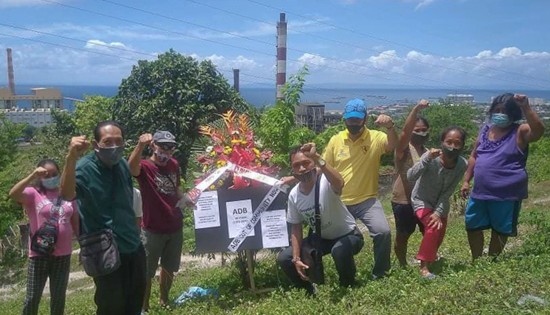Cebuanos tell ADB
to cease funding coal, dirty energy

Press Release
May 4, 2021
QUEZON CITY – The
Power for People Coalition (P4P) and residents of Naga City, Cebu on
Monday demanded a clear commitment from the Asian Development Bank (ADB)
to end its financial support for coal and other dirty energy
projects in the Philippines and Asia through a symbolic action at
the site of the ADB-funded Naga coal plant in Cebu.
The action was held as the
Bank starts its 3-day Annual Meeting, as statement that the impacts
of the coal power and other dirty energy projects must be a
top-of-mind matter in the evaluation and updating of ADB's 2009
Energy Policy and investment decisions.
"For over a decade, ADB
allowed itself to believe that its supposedly 'clean energy' agenda
propelled it towards leadership in sustainability while helping
achieve energy security in its member countries. That is far from
the reality experienced by communities affected by ADB's coal
projects," said Teody Navea, Coordinator of Philippine Movement for
Climate Justice (PMCJ) Cebu. PMCJ is a convenor of P4P.
Inaugurated in 2011 and
currently managed by Korean Electric Power Corporation-Salcon Power
Corporation (KSPC), the 200 MW Naga coal power plant is ADB's first
coal power generation project under its 2009 Energy Policy and was
touted by the Bank as adopting “a more environment-friendly
technology by using circulating fluidized bed (CFB) combustion
boilers". Upon entering operation, the plant was subjected to
complaints from community members and concerned groups for heavy
pollution and noncompliance in social acceptability and public
communication requirements.
"As the Bank's executives
attend their Annual Meeting in the comfort of their homes and
offices, we gather here today to let them know of our health and
livelihood problems, environmental degradation, vulnerability to
climate disasters, and a constant fear for the welfare of future
generations of our people," Navea said.
The groups led a symbolic
wreath-laying activity featuring a 'tombstone' detailing destructive
impacts of ADB's Naga coal plant to community members.
"We live next to a coal
facility that is taking us nearer to our demise with each day it
burns coal and emits toxins into our air, land and water. We know
the same is being experienced by other Filipino communities. It is
in solidarity with them that we urge ADB to lay to rest its dirty
energy legacy and bury its support to coal and other fossil fuels in
the past, so that communities like ours would no longer need to bury
loved ones led to their early deaths by dirty energy," said
Dominador Basaya of the Naga Neighborhood Association.
ADB is expected to
publicize a draft of its updated energy policy around the time of
its Annual Meeting.
"In this Annual Meeting
and its new energy policies, we hope the Bank chooses to initiate
projects that would help communities like ours access clean and
affordable renewable energy sources, of which we know our country is
rich in," Basaya said.
Last week, P4P including
several groups and community organizations from Cebu, submitted to
the Bank a joint Philippine civil society statement urging ADB to
end its dirty energy legacy and align to the 1.5°C Paris ambition.
"ADB’s Energy Policy is
severely outdated in the context of the global energy transformation
and the climate emergency, the deadliest manifestations of which are
already being experienced in our country....ADB is about to make a
critical decision that will define its role in global energy
transformation and addressing the climate emergency. We urge it to
choose to finally end financing for coal and other dirty energy
projects, and set the standard among all other development banks in
climate and sustainable finance leadership," the statement read.